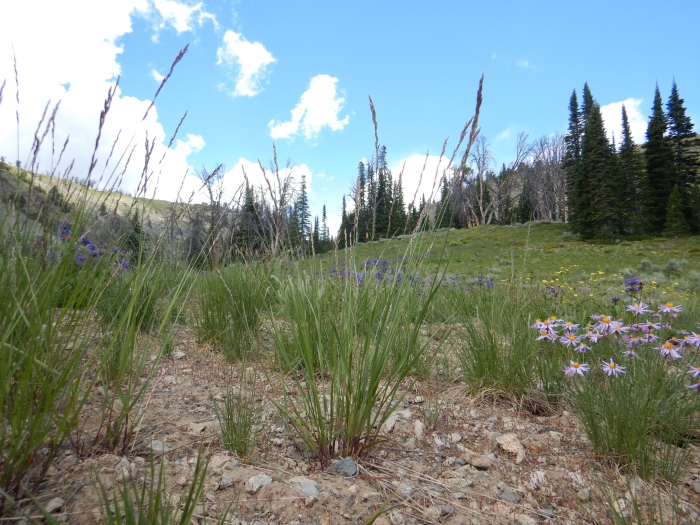Oniongrass
(Melica bulbosa)
Oniongrass (Melica bulbosa)
/
/

Matt Lavin
CC BY 4.0
Image By:
Matt Lavin
Recorded By:
Copyright:
CC BY 4.0
Copyright Notice:
Photo by: Matt Lavin | License Type: CC BY 4.0 | License URL: http://creativecommons.org/licenses/by/4.0/ | Rights Holder: Matt Lavin | Publisher: iNaturalist | Date Created: 2019-07-30T13:31:01-07:00 |

























Estimated Native Range
Summary
Melica bulbosa, commonly known as Oniongrass, is a rhizomatous perennial grass native to western North America, including regions from British Columbia to the Rocky Mountains and California. It is typically found in a variety of habitats such as mountain forests, open hillsides, and streambanks. This species forms loose clusters of stems that can reach up to 1 meter in height. The inflorescence is distinctive, presenting as a narrow or spreading series of spikelets that are bullet-shaped and banded in purple and green, which are particularly noticeable during its flowering season in late spring to early summer.
Oniongrass is valued for its naturalistic appearance and ability to thrive in a range of mountainous and riparian environments. It is often used in native plant gardens, restoration projects, and as an ornamental grass in borders due to its unique inflorescence and the onion-like corms at its base, which contribute to its common name. It prefers well-drained soils and can tolerate a range of light conditions from full sun to partial shade. While generally low-maintenance, it may require division every few years to maintain vigor. Oniongrass is not known for significant pest or disease problems, making it a resilient choice for cultivation.CC BY-SA 4.0
Oniongrass is valued for its naturalistic appearance and ability to thrive in a range of mountainous and riparian environments. It is often used in native plant gardens, restoration projects, and as an ornamental grass in borders due to its unique inflorescence and the onion-like corms at its base, which contribute to its common name. It prefers well-drained soils and can tolerate a range of light conditions from full sun to partial shade. While generally low-maintenance, it may require division every few years to maintain vigor. Oniongrass is not known for significant pest or disease problems, making it a resilient choice for cultivation.CC BY-SA 4.0
Plant Description
- Plant Type: Grass, Herb
- Height: 1.5-2 feet
- Width: 1-2 feet
- Growth Rate: Moderate
- Flower Color: N/A
- Flowering Season: Spring, Summer
- Leaf Retention: Deciduous
Growth Requirements
- Sun: Full Sun, Part Shade
- Water: Medium, High
- Drainage: Fast, Medium, Slow
Common Uses
Bird Garden, Low Maintenance
Natural Habitat
Mountain forests, open hillsides, and streambanks in western North America
Other Names
Common Names: Oniongrass, Bulbous Melic, Western Oniongrass, Big Oniongrass, Bulbous Melicgrass, Western Melicgrass
Scientific Names: , Melica bulbosa, Bromelica bulbosa, Melica bella, Melica bella subsp. intonsa, Melica bella var. intonsa, Melica bulbosa var. bulbosa, Melica bulbosa var. caespitosa, Melica bulbosa var. inflata, Melica bulbosa var. intonsa
GBIF Accepted Name: